A concept that is gaining recognition
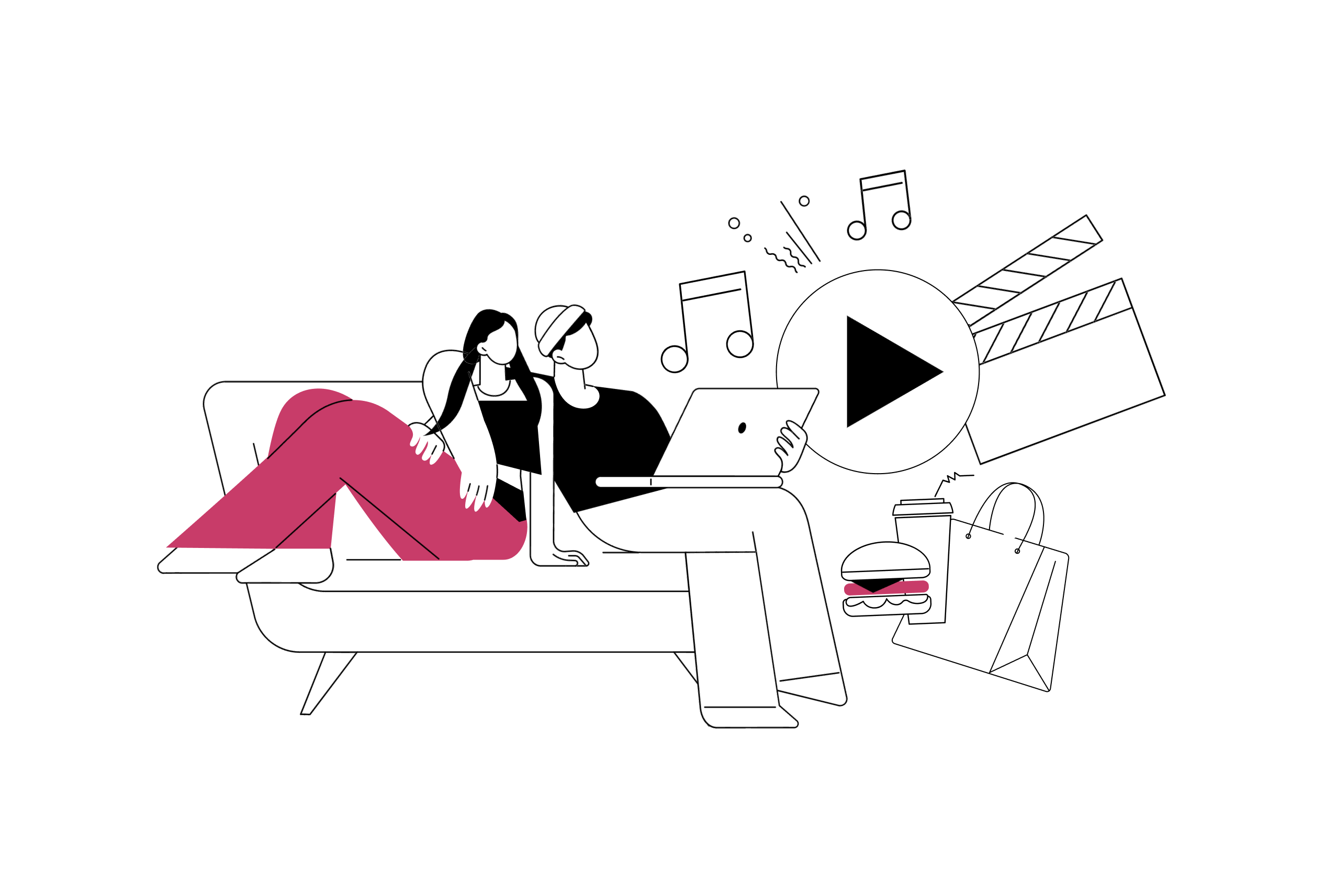

The concept of the circular economy has come a long way since it first emerged in 1990. When combined, these two simple words manage to conjure up a degree of mystery in the eyes of Europeans. Yet, they tend to view the circular economy in a positive light and not simply as a temporary fad. Indeed, they are quite keen to engage in the practices it encompasses in a lasting way and with increasing consistency.
Two words that are becoming more familiar to Europeans
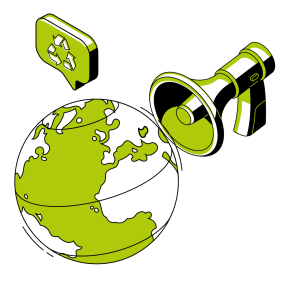
Circular economy. Two simple words which, when combined, still manage to conjure up a degree of mystery and even a sense of the unknown. It is hardly surprising that the concept to which they refer has been assigned a variety of definitions. However, whether it be politicians, the media or NGOs, a whole range of stakeholders have been working closely on the issue over the last few years and are now placing it front and centre.
So, does the circular economy mean anything to Europeans? Almost 7 out of 10 say that it does. It is also encouraging to see that more than a third know exactly what it entails (Fig. 1). However, this awareness is somewhat variable, particularly from country to country.
Fig. 1 Level of knowledge of the circular economy in Europe
Download this infographic for your presentations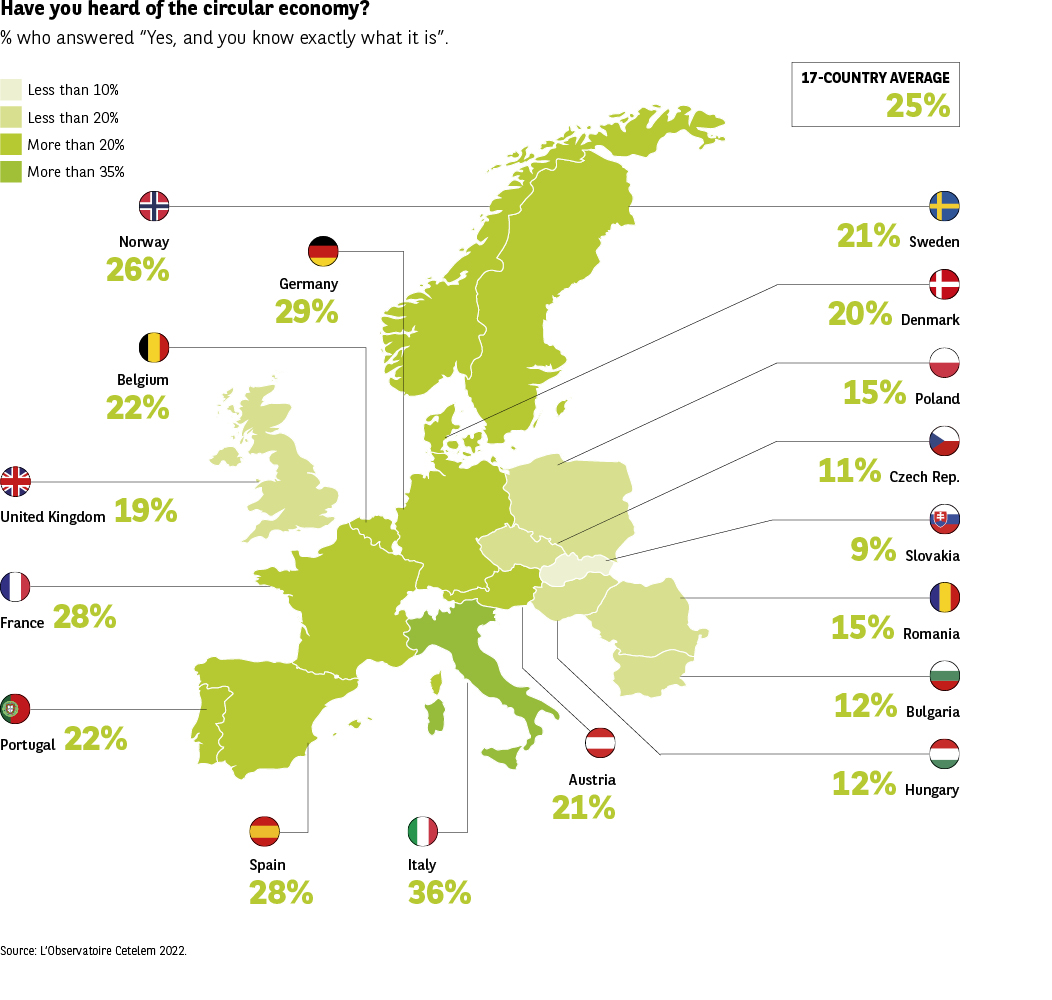 The infographic shows the proportion of people who declare: “Yes, and I see precisely what it is” when asked if they have ever heard of the circular economy. The data covers 17 European countries. A general average is displayed.
The colors of the map (from light green to dark green) indicate levels of knowledge (thresholds: <10%, <20%, <35%, >35%). The colors are decorative but help to visualize the intensity of the rate.
Key visual elements • Map of Europe with color codes by level. • Each country displays: • its flag • a percentage • A summary cartouche: Average of 17 countries: 25%. • Source: Cetelem Observatory 2022.
Transcription of data
Country % knowing precisely the circular economy Germany 29% Austria 21% Belgium 22% Bulgaria 12% Denmark 20% Spain 28% France 28% Hungary 12% Italy 36% Norway 26% Poland 15% Portugal 22% Czech Republic 11% Romania 15% Slovakia 9% Sweden 21% United Kingdom 19% Average of 17 countries: 25%
Main lesson
The precise knowledge of the circular economy remains limited in Europe: only a quarter of Europeans know exactly what it is. The highest levels are found in Italy (36%) and Western Europe (France, Spain, Germany). The countries of Central and Eastern Europe have significantly lower levels (often <15%).
The infographic shows the proportion of people who declare: “Yes, and I see precisely what it is” when asked if they have ever heard of the circular economy. The data covers 17 European countries. A general average is displayed.
The colors of the map (from light green to dark green) indicate levels of knowledge (thresholds: <10%, <20%, <35%, >35%). The colors are decorative but help to visualize the intensity of the rate.
Key visual elements • Map of Europe with color codes by level. • Each country displays: • its flag • a percentage • A summary cartouche: Average of 17 countries: 25%. • Source: Cetelem Observatory 2022.
Transcription of data
Country % knowing precisely the circular economy Germany 29% Austria 21% Belgium 22% Bulgaria 12% Denmark 20% Spain 28% France 28% Hungary 12% Italy 36% Norway 26% Poland 15% Portugal 22% Czech Republic 11% Romania 15% Slovakia 9% Sweden 21% United Kingdom 19% Average of 17 countries: 25%
Main lesson
The precise knowledge of the circular economy remains limited in Europe: only a quarter of Europeans know exactly what it is. The highest levels are found in Italy (36%) and Western Europe (France, Spain, Germany). The countries of Central and Eastern Europe have significantly lower levels (often <15%).
The origins of the circular economy
In the wake of a number of key social movements that shook the world, many intellectuals in the 1970s began to question our way of life and its impact on the planet’s future. Political environmentalism was born and fresh new concepts saw the light of day. For instance, Michael Braungart, a German chemist, and William McDonough came up with the Cradle to Cradle principle, where 100% of a product is used at the end of its life to make an identical new product, without the use of polluting processes. In 1990, the term circular economy was coined in a book co-authored by the British economists David W. Pearce and R. Kerry Turner: Economics of Natural Resources and the Environment. Over the subsequent decades, the concept, which marks a departure from that of the linear economy, has gradually established itself as a new paradigm, to the point where it is now inspiring government policy. Although it can be defined in a number of ways, it is often symbolised and summed up by the 3Rs: Recycle, Reduce, Reuse. For the purposes of this survey, we will use the following definition*: “the circular economy is an economic system in which, at every stage in their lifecycle, products (goods and services) are produced and traded in such a way as to increase the efficiency with which resources are used and to reduce their environmental impact, while enhancing the well-being of individuals”.
* French Environment and Energy Management Agency (ADEME, France).
The most astute consumers on this topic can be found in Southern and Western Europe. For instance, 36% of Italians are able to accurately define these two words. This is not particularly surprising in a country where localism and environmentally sound practices in general are relatively widespread, as previous Observatoire Cetelem surveys have often highlighted. In the East, perceptions are not as sharp and the words hold less meaning. Only 9% of Slovaks have a clear idea of what the circular economy is.
When people are questioned regarding their exact understanding of the term circular economy, a generational divide emerges that reappears on numerous occasions during the course of this survey. Under 50s are noticeably more au fait with the meaning of the term than their elders.
fig. 2 Evolution of European policies on the circular economy
Download this infographic for your presentations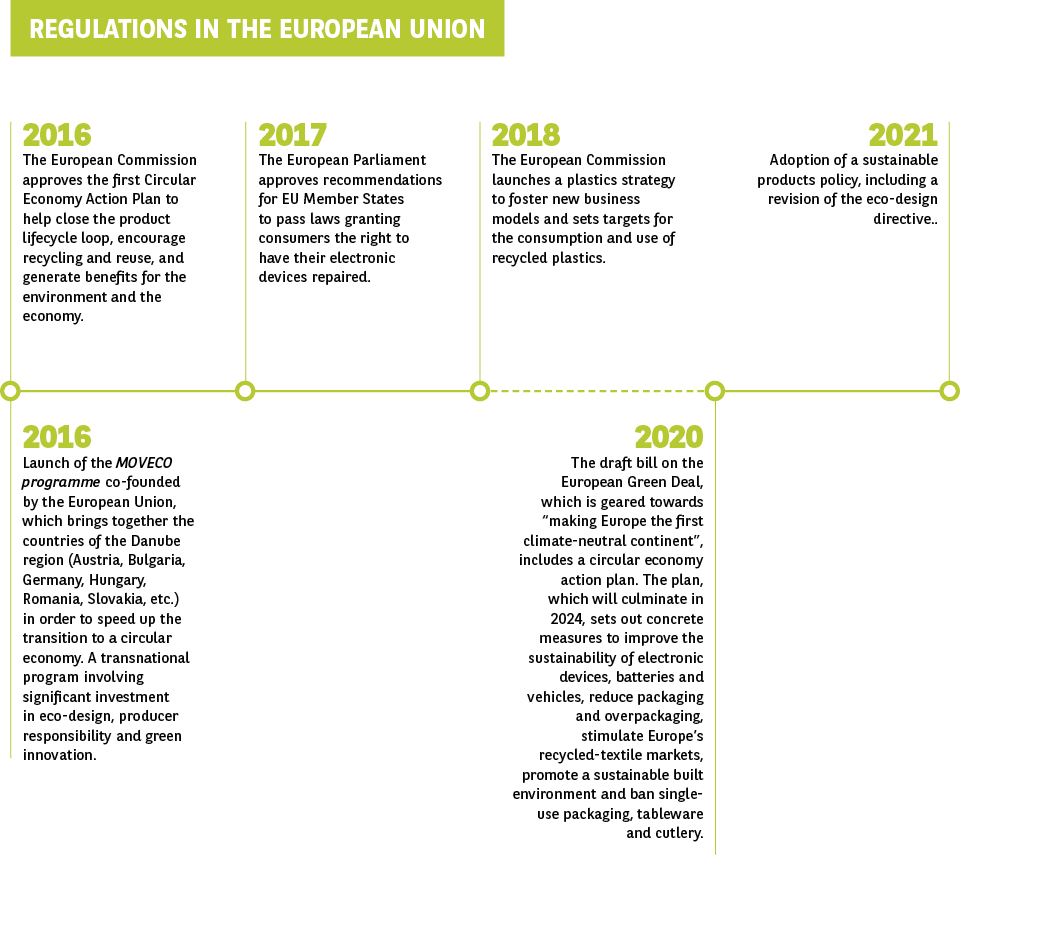 The infographic retraces the main regulations and initiatives carried out by the European Union to accelerate the transition to the circular economy between 2016 and 2021. The timeline is horizontal, with each year containing a descriptive text block. The graphic elements (milestones, horizontal lines) are decorative.
Key visual elements • Timeline: 2016 → 2017 → 2018 → 2020 → 2021 • A detailed text for each year. • A second block under the timeline for 2016 and 2020 (specific programs). • Source: Cetelem Observatory 2022.
Transcription of data
2016 (top block) The European Commission adopts the first action plan for the circular economy: • contribute to “closing the loop” of the product life cycle, • encourage recycling and reuse, • bring benefits for the environment and the economy.
2017 The European Parliament approves recommendations encouraging Member States to adopt laws: • giving consumers the right to repair electronic devices.
2018 The European Commission launches a strategy on plastics, aiming: • at new business models, • at consumption-related objectives, • at increasing the use of recycled plastic.
2020 (top block) The European Green Deal project: • aims for a climate-neutral continent, • includes an action plan for the circular economy, • sets measures for 2024: improving sustainability (electronics, batteries, vehicles), • reducing packaging and over-packaging, • developing recycled textiles, • banning certain single-use packaging.
2021 Adoption of a policy on sustainable products, including: • a revision of the eco-design directive.
The infographic retraces the main regulations and initiatives carried out by the European Union to accelerate the transition to the circular economy between 2016 and 2021. The timeline is horizontal, with each year containing a descriptive text block. The graphic elements (milestones, horizontal lines) are decorative.
Key visual elements • Timeline: 2016 → 2017 → 2018 → 2020 → 2021 • A detailed text for each year. • A second block under the timeline for 2016 and 2020 (specific programs). • Source: Cetelem Observatory 2022.
Transcription of data
2016 (top block) The European Commission adopts the first action plan for the circular economy: • contribute to “closing the loop” of the product life cycle, • encourage recycling and reuse, • bring benefits for the environment and the economy.
2017 The European Parliament approves recommendations encouraging Member States to adopt laws: • giving consumers the right to repair electronic devices.
2018 The European Commission launches a strategy on plastics, aiming: • at new business models, • at consumption-related objectives, • at increasing the use of recycled plastic.
2020 (top block) The European Green Deal project: • aims for a climate-neutral continent, • includes an action plan for the circular economy, • sets measures for 2024: improving sustainability (electronics, batteries, vehicles), • reducing packaging and over-packaging, • developing recycled textiles, • banning certain single-use packaging.
2021 Adoption of a policy on sustainable products, including: • a revision of the eco-design directive.
fig. 2 National measures in favor of the circular economy
Download this infographic for your presentations The infographic presents, in the form of a vertical list, the main regulatory and strategic initiatives adopted by several European countries to accelerate the circular economy. Each entry includes: • the country’s flag, • the year, • a summary of the initiative. The icons (lines, alignments) are decorative.
Key visual elements • List of 7 countries: Sweden, Belgium, Spain, Germany, Czech Republic, France, United Kingdom. • Chronology: 2016 to 2020. • Source: Cetelem Observatory 2022.
Transcription of data
Sweden — 2016 Bill allowing households: • to deduct half of the labor cost for repairs from their taxes, • to reduce VAT on repair activities. Objective: to encourage repair rather than buying new.
The infographic presents, in the form of a vertical list, the main regulatory and strategic initiatives adopted by several European countries to accelerate the circular economy. Each entry includes: • the country’s flag, • the year, • a summary of the initiative. The icons (lines, alignments) are decorative.
Key visual elements • List of 7 countries: Sweden, Belgium, Spain, Germany, Czech Republic, France, United Kingdom. • Chronology: 2016 to 2020. • Source: Cetelem Observatory 2022.
Transcription of data
Sweden — 2016 Bill allowing households: • to deduct half of the labor cost for repairs from their taxes, • to reduce VAT on repair activities. Objective: to encourage repair rather than buying new.
A positive image
Although the words might not resonate with everyone, overall perceptions are very positive (Fig. 2). Once the concept has been explained to them, more than 8 out of 10 Europeans view it in a positive light. The Italians are extremely receptive to the idea, but the Portuguese are even more so (93% and 94%). Once again, one must travel east to find more dissenting voices, the Czechs being a case in point, although the positivity score remains very high (73%).
Fig. 2 Perception of the circular economy by the public
Download this infographic for your presentations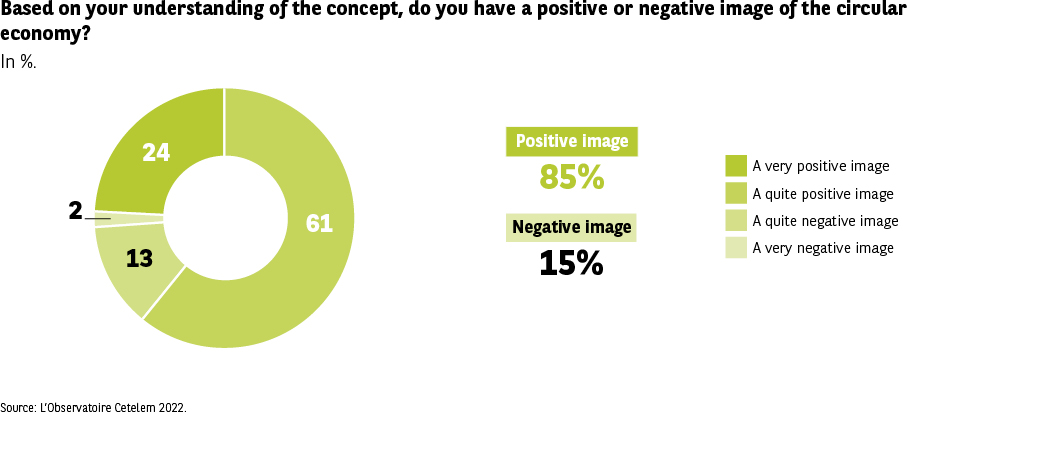 The infographic presents the general perception of the circular economy among respondents, distinguishing four levels of opinion: • very good image • rather good image • rather bad image • very bad image
It is represented in the form of a ring diagram accompanied by a textual summary. The light green and dark green colors are decorative.
Key visual elements • Circular diagram segmented into four parts. • Legend indicating “Good image: 85%” and “Bad image: 15%”. • Source: Cetelem Observatory 2022.
Transcription of data
Detailed distribution • Very good image: 24% • Rather good image: 61% • Rather bad image: 13% • Very bad image: 2%
Visual summary • Good image (total): 85% • Bad image (total): 15%
The infographic presents the general perception of the circular economy among respondents, distinguishing four levels of opinion: • very good image • rather good image • rather bad image • very bad image
It is represented in the form of a ring diagram accompanied by a textual summary. The light green and dark green colors are decorative.
Key visual elements • Circular diagram segmented into four parts. • Legend indicating “Good image: 85%” and “Bad image: 15%”. • Source: Cetelem Observatory 2022.
Transcription of data
Detailed distribution • Very good image: 24% • Rather good image: 61% • Rather bad image: 13% • Very bad image: 2%
Visual summary • Good image (total): 85% • Bad image (total): 15%
A modern phenomenon, but more than just a fad
This positive perception of the circular economy is reflected in the opinions of those who associate it with equally positive values (Fig. 3). Indeed, 85% of Europeans believe that it is beneficial to the environment and natural resources, which happens to be one of its primary objectives. The Portuguese and Italians are the most likely to express this view (92%). The second quality associated with the circular economy is its capacity for innovation, as highlighted by 82% of Europeans, with the Italians and Portuguese again proving slightly more enthusiastic than the rest, although there are no major differences between the countries. Completing the podium in third place is job creation, an attribute put forward by 75% of Europeans, with very few divergences between the nations.
Fig. 3 Perceptions of the effects of the circular economy
Download this infographic for your presentations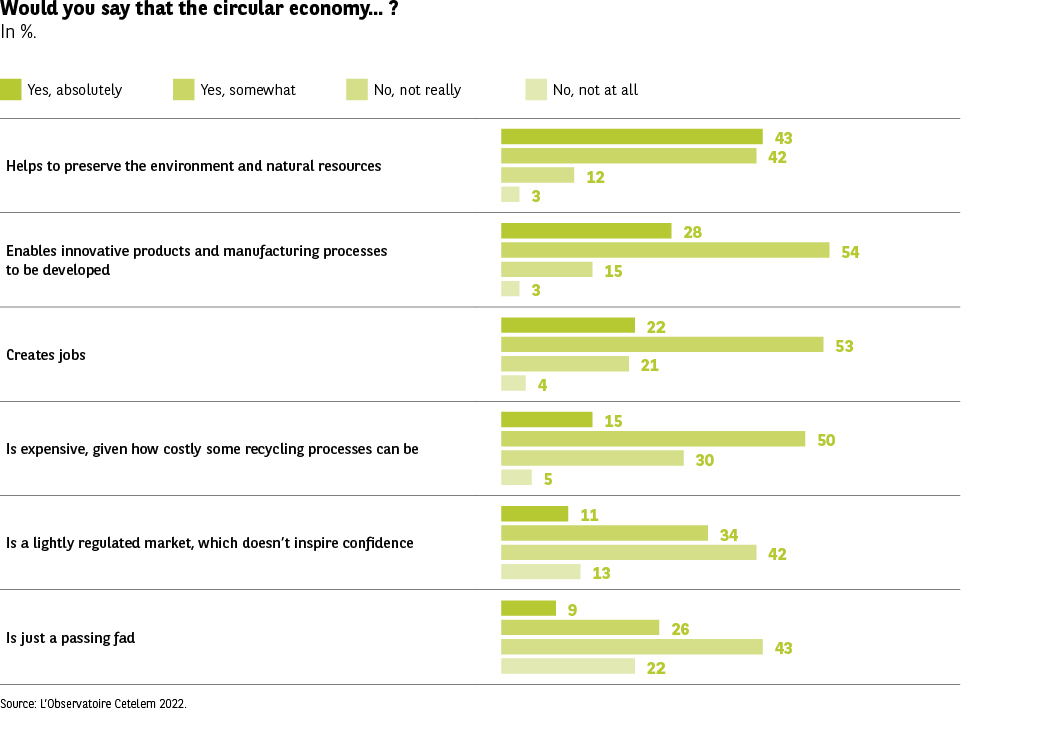 The infographic presents the opinion of respondents regarding several statements related to the circular economy. For each statement, four levels of response are proposed: • Yes, totally • Yes, rather • No, rather not • No, not at all
The bars are green (variable intensity) but these colors are decorative.
Key visual elements • Horizontal graph with six statements. • Four bars per statement (two positive, two negative). • Source: Cetelem Observatory 2022.
Transcription of data
1. Preserve the environment and natural resources • Yes, totally: 43% • Yes, rather: 42% • No, rather not: 12% • No, not at all: 3%
2. Develop innovative products and manufacturing processes • Yes, totally: 28% • Yes, rather: 54% • No, rather not: 15% • No, not at all: 3%
3. Create jobs • Yes, totally: 22% • Yes, rather: 53% • No, rather not: 21% • No, not at all: 4%
4. Is expensive (very costly recycling) • Yes, totally: 15% • Yes, rather: 50% • No, rather not: 30% • No, not at all: 5%
5. Unregulated market that does not inspire trust • Yes, totally: 11% • Yes, rather: 34% • No, rather not: 42% • No, not at all: 13%
6. Is a fad • Yes, totally: 9% • Yes, rather: 26% • No, rather not: 43% • No, not at all: 22%
Main lesson
The majority of respondents consider that the circular economy protects the environment, encourages innovation, and can create jobs. However, reservations are expressed: • 65% judge that some processes remain costly, • 45% estimate that the market still lacks regulation, • Only 35% think it is a fad.
Overall, the circular economy benefits from high trust capital, despite some structural concerns.
The infographic presents the opinion of respondents regarding several statements related to the circular economy. For each statement, four levels of response are proposed: • Yes, totally • Yes, rather • No, rather not • No, not at all
The bars are green (variable intensity) but these colors are decorative.
Key visual elements • Horizontal graph with six statements. • Four bars per statement (two positive, two negative). • Source: Cetelem Observatory 2022.
Transcription of data
1. Preserve the environment and natural resources • Yes, totally: 43% • Yes, rather: 42% • No, rather not: 12% • No, not at all: 3%
2. Develop innovative products and manufacturing processes • Yes, totally: 28% • Yes, rather: 54% • No, rather not: 15% • No, not at all: 3%
3. Create jobs • Yes, totally: 22% • Yes, rather: 53% • No, rather not: 21% • No, not at all: 4%
4. Is expensive (very costly recycling) • Yes, totally: 15% • Yes, rather: 50% • No, rather not: 30% • No, not at all: 5%
5. Unregulated market that does not inspire trust • Yes, totally: 11% • Yes, rather: 34% • No, rather not: 42% • No, not at all: 13%
6. Is a fad • Yes, totally: 9% • Yes, rather: 26% • No, rather not: 43% • No, not at all: 22%
Main lesson
The majority of respondents consider that the circular economy protects the environment, encourages innovation, and can create jobs. However, reservations are expressed: • 65% judge that some processes remain costly, • 45% estimate that the market still lacks regulation, • Only 35% think it is a fad.
Overall, the circular economy benefits from high trust capital, despite some structural concerns.
As confirmation of its potential staying power, only 35% of Europeans consider the circular economy to be a fad. One nation clearly stands out on this issue, with respondents expressing a view that sets it apart from the other countries. Indeed, 52% of those interviewed in France see the circular economy as a temporary trend.
